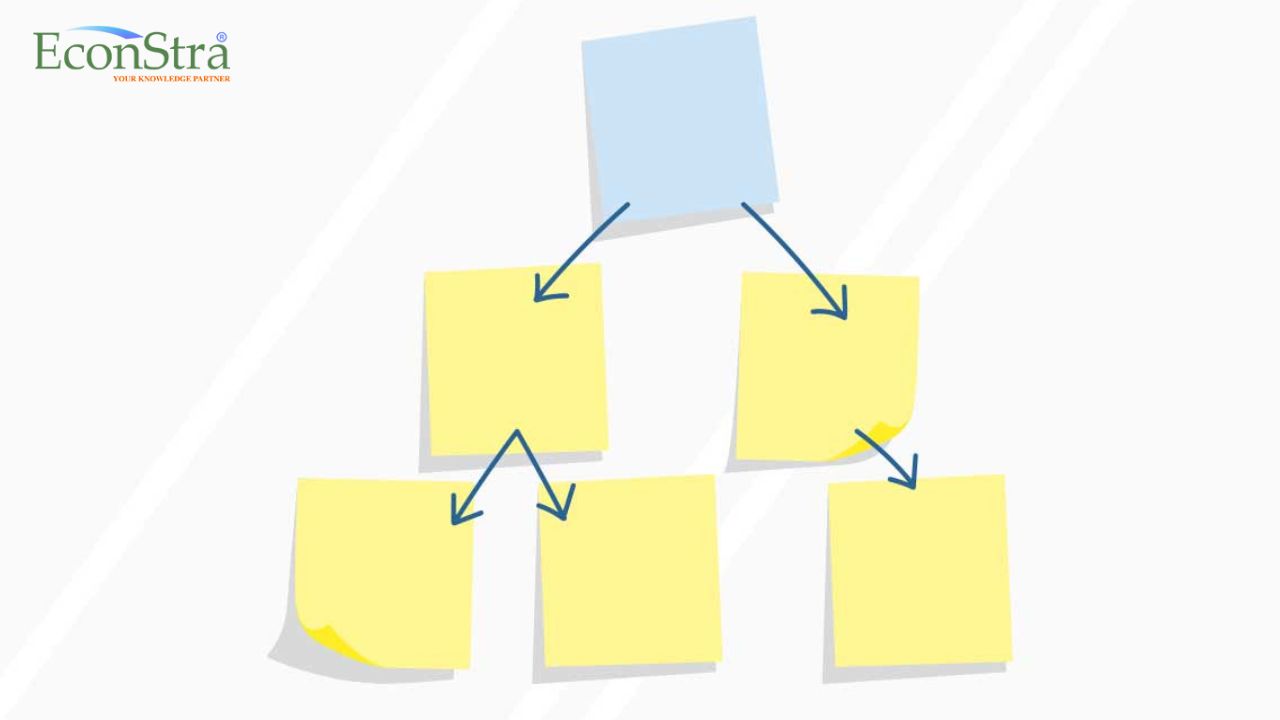by Subhadeep Chowdhury
Share

Have you ever found yourself staring at a looming project, overwhelmed by its sheer complexity and unsure where to even begin? Perhaps you have experienced the frustration of racing against the clock, only to find yourself burning the midnight oil to meet a deadline.
In a world where efficiency is key and time is precious, navigating through intricate projects can be a daunting task. What if there existed a method to streamline the process? What if you could systematically break down your projects into manageable tasks, paving the way for smoother progress and timely completion?
In this article, we invite you to explore a game-changing approach to project management—one that harnesses the power of software to streamline your workflow and boost productivity. Join us as we unveil the transformative benefits of dissecting projects into bite-sized tasks, empowering you to navigate even the most intricate endeavors with ease.
From the initial spark of inspiration to the final deliverable, we’ll guide you through the step-by-step process of harnessing software tools to orchestrate your project journey. Say goodbye to overwhelm and hello to a newfound sense of clarity and efficiency.
How Software Can Help Break Projects Down into Tasks?
So, if you are ready to revolutionize the way you tackle projects and bid farewell to missed deadlines, join us on this journey as we delve into the art of breaking projects down into tasks. Your future productivity awaits!
Steps of Breaking Down a Project into Tasks
Dismantling a project into its constituent tasks can be likened to disassembling a complex mechanism into simpler, manageable units. The method you select to fragment your project is contingent on the nature of the endeavor itself. Broadly speaking, you might consider one of three primary strategies:
Segmentation by Phases: This is common in scenarios such as software development, where the project progresses through a series of sequential stages.
Categorization: For events like organizing a conference, you might break the project down into distinct categories—such as catering, photography, and speaker management.
Dividing by Components: In more physical tasks, such as house cleaning, the approach might involve tackling the project room by room.
However, it is critical to recognize that projects often don’t fit neatly into these compartments. Therefore, a tailored approach that adapts to the nuances of the project could be more effective.
Steps to Segment a Project into Tasks
The process starts with a thorough analysis of the tasks that constitute the project, understanding their interdependencies, and acknowledging the temporal constraints they operate under. This understanding paves the way for a robust segmentation strategy.
Here’s how you can approach it:
- Task Identification: At first glance, identifying tasks might seem straightforward, but it requires careful consideration. In personal contexts, simple activities like making your bed or answering emails mark clear tasks. In professional settings, however, the definition of a task is often more nuanced due to the variability and dependencies of the tasks involved.
- Dependency Examination: Once tasks are identified, assess their dependencies. This helps prioritize tasks and streamline the workflow, essential for maintaining project momentum.
- Milestone Creation: Establishing milestones is crucial as they act as checkpoints that help gauge the progress of the project. They provide a framework within which tasks are organized and evaluated for their scope and timing.
Practical Tips for Task Formation
- Time-Based Task Identification: Use guidelines like the “Rule of Twos” (tasks should not be shorter than two days or longer than two weeks) or the 80-hour rule (no single task should exceed 80 hours) to determine the appropriate scope for tasks.
- Importance-Based Task Identification: Begin by determining which tasks are critical for the project’s completion. This approach not only helps in breaking down the project into larger segments but also highlights key milestones.
- Collaborative Task Identification: Engage with your team to leverage their insights for accurate task estimation and prioritization. Each member’s expertise can provide valuable input into the time and steps required to complete a task.
- Definition-Based Task Identification: Adopt the “definition of done,” which focuses on completing tasks to a “good enough” standard rather than perfection. This practice is prevalent in Agile methodologies and can be adapted to various industries.
By employing these strategies, you can devise a task breakdown that is both efficient and adaptable, suited to the specific demands of your project.
Importance of Effective Task Management
Task management plays a pivotal role in the seamless execution of projects within any organization. By breaking down complex projects into manageable tasks, organizations can enhance efficiency, ensure timely completion, and foster a collaborative work environment.
Today this blog post delves into the nuanced facets of task management software, elucidating how it can revolutionize project execution for businesses.
Also check our articles: Understanding Task Management In The Modern Workplace
Understanding Task Management Software
Task management software is a sophisticated tool designed to optimize the organization and oversight of project tasks. It transcends the conventional to-do list by offering comprehensive features that facilitate the tracking and coordination of tasks across various projects and teams. This software provides a centralized platform where tasks are not only listed but also categorized, prioritized, and assigned specific deadlines.
Key Features of Task Management Software
- Task Assignment and Scheduling: Effective project management begins with assigning tasks to team members and setting clear deadlines. By allocating responsibilities and timelines upfront, everyone understands their role in the project, fostering accountability and clarity.
- Progress Tracking: Stay on top of project milestones with intuitive dashboards that offer real-time updates on task progress. Visualizing progress allows for timely adjustments and ensures that the project stays on course to meet its objectives.
- Collaboration Tools: Foster seamless collaboration among team members by leveraging features within task management systems that facilitate communication and resource sharing. From sharing notes and files to providing feedback, these tools promote synergy and enhance team cohesion throughout the project lifecycle.
Implementing Effective Team Task Management
Effective team task management requires a systematic approach to allocate and monitor tasks within a team. The process involves:
- Breaking Down Projects: Divide projects into smaller, more manageable tasks and subtasks, assigning realistic start dates and deadlines.
- Assessing Task Requirements: Evaluate the resources and time each task demands, setting priorities accordingly.
- Monitoring Progress: Keep track of task statuses to ensure the project stays on course and adjusts as necessary.
Strategies for Optimizing Task Management
- Utilize Software Tools: Implement task management software like Workiro, which offers features like automated reminders and progress tracking.
- Regular Updates: Maintain communication with team members about task progress and any adjustments needed.
- Assess and Adapt: Regularly review the task management process and make improvements based on feedback and observed challenges.
Also check our article: Common Mistakes In Task Management
The Synergy between Time and Task Management
Time management is crucial in maximizing the productivity of task management. Integrating these two aspects ensures that tasks are completed within the allocated time frames, thereby enhancing overall project efficiency.
Integrating Time Management with Task Management
- Prioritize Tasks: Use time management techniques to identify which tasks should be tackled first based on urgency and importance.
- Schedule Wisely: Allocate time blocks for focused work on specific tasks, minimizing the risk of context-switching and distractions.
- Review and Adjust: Continuously assess how time is spent on tasks and adjust schedules and priorities to improve time allocation.
Choosing the Right Task Management Software
Selecting the most appropriate task management software is vital for effective project execution. Consider the following factors when choosing a software tool:
- Feature Set: Ensure the software has all the necessary features to meet your project needs, such as integration capabilities, real-time updates, and customizable task categories.
- User-Friendliness: Opt for software that is intuitive and easy to use to minimize the learning curve for team members.
- Scalability: Choose a tool that can scale with your business, accommodating more projects and users as your needs grow.
Also read: Why Does Every Industry Need A Task Management Tool?
NOTE:

In today’s dynamic business landscape, the ability to break down projects into manageable tasks is paramount for success. Econstra, a leading business consultant, recognizes the significance of this process and champions the integration of software solutions to streamline task management. In our article, “How Software Can Help Break Projects Down into Tasks,” we delve into the transformative power of technology in enhancing project efficiency and productivity. By leveraging Econstra’s innovative task management tools, businesses can effectively dissect complex projects into actionable steps, allocate resources efficiently, and track progress in real-time. With intuitive interfaces and customizable features, these software solutions empower teams to collaborate seamlessly, ensuring alignment towards project milestones and objectives. From brainstorming sessions to project execution, Econstra’s software equips businesses with the tools they need to navigate the intricacies of project management with ease and precision.
The Final Thoughts
In conclusion, effective task management is achievable through the strategic use of software tools that facilitate the organization, prioritization, and monitoring of tasks. By choosing the right task management software and integrating effective time management strategies, organizations can significantly enhance project efficiency and team productivity. The right tool not only simplifies task management but also propels your projects towards timely and successful completion.
Adopting a systematic approach to task management, supported by robust software solutions, ensures that projects are not just completed, but are completed well. As you navigate the complexities of project and task management, remember that the tools and strategies you employ can significantly influence your operational success.
STAY IN THE LOOP
Subscribe to our free newsletter.
Business consultant services provide the strategic insight and expertise necessary to steer your company through various challenges and opportunities. These professionals play a crucial role in helping businesses identify growth opportunities, optimize operations, and achieve long-term success. Understanding the Role of a Business Consultant A business consultant acts as an external advisor who brings a […]
In today’s competitive business landscape, companies are constantly seeking ways to reduce operational costs while maintaining or improving efficiency and customer satisfaction. Customer Relationship Management (CRM) systems have emerged as vital tools that enable businesses to achieve these goals. As a leading business consultancy, Econstra understands the importance of leveraging CRM technology to streamline operations, […]
Why Operational Costs Are Draining Your Profits? Operational costs are a critical aspect of running a successful business, but when not managed properly, they can drain your profits and stifle growth. In a competitive market, maintaining profitability requires keen oversight of expenses and strategic planning. Econstra, as a leading business consultancy, provides insights and strategies […]
In the rapidly advancing digital landscape, Artificial Intelligence (AI) tools have emerged as transformative assets for businesses. Their potential to enhance efficiency, streamline operations, and drive innovation makes them invaluable for business consultants and organizations worldwide. For business consultants in India, AI’s strategic application can be particularly advantageous in navigating a diverse and dynamic market. […]




